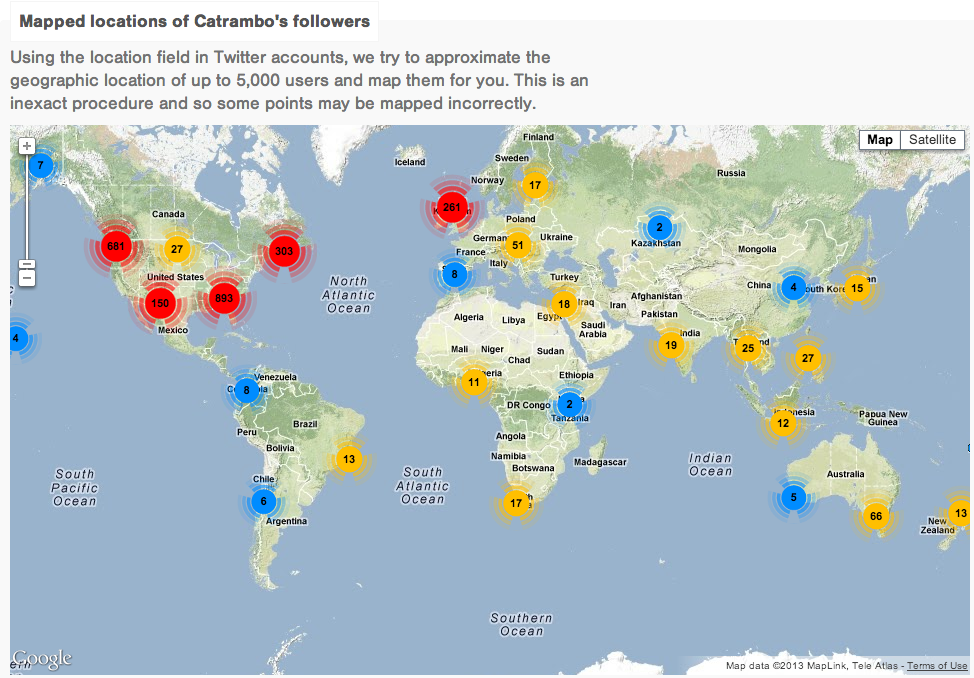I spend at least a little time each day looking at social media news and new stuff and track the most useful links here. If you enjoyed last week’s Pinterest Analytics post, are interested in using that social network more effectively, and have an hour where you need something to listen to, I recommend this webinar. Among other things, I found out why people do those long tall pictures/infographics (which was obvious once I thought about it, so everyone else in the world may have already figured that out).
So here’s some thoughts after spending some time poking at an app provided by Seomoz.org, Followerwonk, a Twitter Analytics tool.
So – why be interested in analytics of any kind, whether it’s Google, Pinterest, Facebook, or Twitter? Because numbers let you know what works and what doesn’t in driving traffic to your site. Figure out what works and do more of that. Figure out what doesn’t work and do less.
Followerwonk gives you a number to track, Social Authority, that measures your influence on Twitter. Its formula is based on three factors:
- The retweet rate for a user’s last few hundred tweets
- How recent those tweets were
- A somewhat nebulous thing that Followerwonk explains as “A retweet-based model trained on user profile data), which I believe is their way of saying, “Part of our algorithm is hidden so users can’t game it, but there’s something there, really.”
Personally, I’m wondering whether someone favoriting your tweet has any influence. Based on what they’re saying here, it doesn’t, and it seems like it should.
But you don’t want to know your social authority score so much as someone else’s. Followerwonk is intended to help you identify followers with a high social authority score so you can target them with your message.
With that in mind, here are the main capabilities:
- Search Twitter bios: Identify people with specific keywords in their bios or other traits such as number of followers, age of account (Followerwonk notes about this figure: “The age of an account is an interesting way to measure value. Users who have been on Twitter for a while are early adopters, and generally more valuable than newbies. As well, there is a higher percentage of spam accounts in newer user segments (as Twitter has not yet cleared them out).”), and Social Authority. This is actually pretty powerful. You can narrow things down by geographical location and set min/max number of tweets, followers, and following.
- Compare users: Compare several Twitter users in terms of the users they follow or those who follow them. It’s certainly always nice to see a Venn diagram and know those days in math class learning what they are wasn’t wasted, but I don’t know that I found this report particularly useful, except that it did indicate I should be RTing and @connecting more.
- Analyze followers: Here Followerwonk lets you analyze your or any other user’s followers or who is being followed. You can see them on a map, which is nifty, and I’ve included an example of one. I learned, unsurprising, that my largest group of followers occurs in the same geographical region I’m in, but also, surprisingly, that the next largest group is in the Southern United States. Other ways to sort them includes by gender, social authority rank, follower/following accounts, tweet numbers, language, the time they’re most active, as well as a couple of interesting word clouds generated through bio information.
- Track followers: Changes to your social graph are presented in this tab, but only if you’re paying for this functionality. Otherwise all you can do is see this data for the Twitter user @followerwonk.
- Sort followers: Again, paid functionality, which lets you sort a follower list by social authority, tweets, number following/followed by, and account age.

As with many tools, here you’re been given a taste in order to persuade you to cough up for the paid version. If I had the budget for it, Followerwonk is definitely worth paying for, and it’s just part of the tools from a SEOMoz Pro membership – but they run $99 a month, which is going to be outside the reach for most people working on their own publicity. For a deeper look at Followerwonk, try Gianluca Fiorelli’s How I Use Followerwonk and Why I Love It.
Other Social Media Links of Interest:
I’m looking at this tool and will be writing it up in the future: Buffer, which lets you schedule Facebook, Twitter, LinkedIn, and App.net with the free version, and up to twelve networks with the paid version.
An excellent piece on Goodreads for promotion that should interest writers.
A massive trove of SEO links that I am still going through.
Beth Barany provides some tips for shy writers on how to promote your book on Twitter.
Are you a writer interested in finding out how to effectively promote yourself via the Internet? Sign up for my Building an Online Presence for Writers class. It’s taught online via Google Hangouts and the next session is Sunday, 9:30-11:30 AM PST, July 14.








One Response